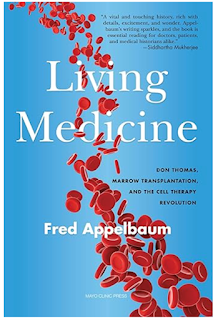Living Medicine – lessons for the experimental hematologist
As a clinical hematologist, the publication of Living Medicine - a history of the development of bone marrow transplantation in humans - was required reading. However, I was pleasantly surprised to see that Dr. Appelbaum carefully reviews the history of the fundamental basic science of hematopoietic stem cells, the understanding of which forms a required basis for clinical transplantation. From the perspective of an experimental hematologist, it was fascinating to learn how the pioneers of clinical transplantation leveraged fundamental science done in mice into translational studies and iterative clinical trials to progressively develop, improve, and optimize allogeneic bone marrow transplantation. Laboratory based research was vital in the iterative trials that moved bone marrow transplantation from a high-risk intervention for patients with no other options to now a much safer front-line therapy for many blood diseases. Although Dr. Appelbaum justifiably emphasizes the foundational and bold work done in Seattle, he acknowledges the contribution of other researchers throughout the world. He also emphasizes the importance of advocacy of patients and families in supporting early research in bone marrow transplantation and places the patient experience at the center of his narrative. He also discusses the current state of basic research and its ongoing and potential impact on engineered cellular therapy and immunotherapy.
While this book on the surface appeals to clinicians engaged in bone marrow transplantation, it is also an inspiring read for basic scientists in hematology. It reminds us of the essential nature of our work in the formation of the rationale and premise for clinical innovations. By charting the arc from the basic studies demonstrating the existence and properties of the hematopoietic stem cell to the current state of the art in bone marrow transplantation, Dr. Appelbaum’s work should inspire the current generation of basic scientists by illustrating the immense potential impact of our work. His description of the more recent foundational work in cancer immunotherapy and chimeric antigen receptor T-cells and the ongoing clinical translation of this work shows this history repeating itself for the hopeful ongoing benefit of patients.
Living Medicine is available on amazon.com.
Blog post contributed by Grant Rowe, MD, PhD (@bloodandtime1), ISEH Publications Committee
Please note that the statements made by Simply Blood authors are their own views and not necessarily the views of ISEH. ISEH disclaims any or all liability arising from any author's statements or materials.


.png)


Comments
Post a Comment